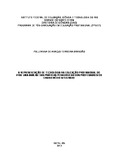A representação de tecnologia na educação profissional do IFRN: uma análise das práticas pedagógicas dos professores do ensino médio integrado

Visualizar/
Data
2016-05-23Autor
Brandão, Pollyanna de Araújo Ferreira
Metadado
Mostrar registro completoResumo
This research aims to investigate the representation of IFRN teachers in
relation to technology by analyzing the reports of pedagogical practices developed in
Integrated High School (IHS). The EMI is a teaching model that aims to integrate
Basic Education (BE) and Professional Education (PE), which has as its structuring
axes science, technology, work and culture, proposing to overcome the dichotomy
between intellectual education and instrumental education By means of a
pedagogical proposal based on the integral human formation. Teachers play a key
role in mediating the use of technologies in PE aimed at emancipatory training.
Therefore, it is necessary to analyze if the representation of technology by the
teachers that work in the EMI dialogues with the conception of integral human
formation. The methodology adopted for the accomplishment of this research is
qualitative, we used the bibliographical revision to raise the theoretical reference on
the relationship between education, work and technology, from authors like Feenberg
(2013), Vieira Pinto (2005), Lima Filho (2010), Frigotto (2005), Ciavatta (2005) and
Ramos (2010). We used the documentary analysis of the National Guidelines for
Basic Education (2013) and the Political Pedagogical Project of the IFRN (2012) that
presented the pedagogical proposal of the use of technologies in professional
education, as well as the content analysis of Bardin (2011) For systematization of
data collection. Finally, we conducted narrative interviews (Bauer and Gaskell, 2015)
with nine teachers from an IFRN Campus who work in the IHS in the Metropolitan
Region of Natal in the courses of Computer Science and Mechatronics. The
representations of teachers' technologies were analyzed based on the concept of
representation of Chartier (1988). We could identify that although the documents
analyzed evolved when they presented a proposal of the use of technologies based
on integral human education and work as an educational principle, these documents
have not been constituted as reference for the teaching practice of the teachers
interviewed. From the experience reports of the teachers, we observe that there are
indications of representations of technologies in which the teachers reproduce in their
speeches the conception of a proposal directed to attend to the logic of capital. This
view represents almost fifty percent of the teachers interviewed. We point out
possible factors that influenced this view: the professional profile, since part of the
faculty is composed of professors who are not graduates: bachelors and
professionals in the technological area; The lack of knowledge of the pedagogical
proposal regarding the use of technologies in professional education foreseen in the
IFRN's Political Pedagogical Project and the teachers' reports that there are no
systemic actions of teacher training for the use of the technologies in PE developed
by the IFRN. Therefore, we defend the need to strengthen continuing education
actions that could consolidate a more critical reflection on the theme of this research.



